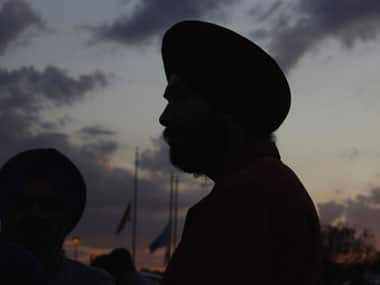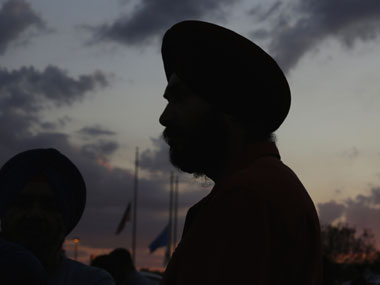The Sikhs are fighting a new battle in America. The New York Times
reports
that Maj. Kamaljeet Singh Kalsi, an American Sikh raised in New Jersey is fighting to rescind rules about appearance that dissuade Sikhs from joining the military. (Read the full story
here
.) He wants to get rid of those rules that require Sikhs to choose between their beard, unshorn hair and the turban and the right to serve in the army. He even created his own turbans, made of camouflage materials, and bearing his rank insignia. The military, like all militaries, emphasizes uniformity and discipline and is loath to make an exception for anyone. [caption id=“attachment_941881” align=“alignleft” width=“380”]
 Representational image. Reuters[/caption] Folks say, ‘If you really want to serve, why don’t you cut your beard?’ ” said Major Kalsi. But the usual arguments about patriotism and discrimination aside, Sikhs actually have another interesting argument to press their case. After 9/11, their beards and turbans made them vulnerable to attacks and hate crimes by those who decided they were Osama bin Laden look-alikes. Last year six were shot to death in a gurudwara in Wisconsin. Kalsi reasons that’s why more Sikhs, turbaned and bearded, should be visible as soldiers and firefighters. “When you see a Sikh firefighter save your daughter, you’ll think, ‘That’s a member of my community,’ ” said Kalsi. The army is not the only places Sikhas have had to fight for acceptance. They have filed cases against companies like AutoZone. Major Raghbir Gill
sued for the right to be a federal security officer
and carry his articles of faith. Because of that case Sikhs can now serve as contract security guards with the federal government with unshorn hair, beards, turbans, and kirpans intact. According to a Sikh Coalition report published in 2010, approximately 12% of Sikhs in the San Francisco Bay Area believe that they have experienced job discrimination. Major law enforcement agencies in California refuse to hire Sikhs. The army remains one of the last frontiers. That attitude change has to start from the top. Former representative John Cooksey of Louisiana infamously said after 9/11 that if “someone who comes in that’s got a diaper on his head and a fan belt wrapped around the diaper on this head, that guy needs to be pulled over.” Xenophobic comments like these, write Deepa Iyer and Priya Murthy of SAALT, aren’t just racist. The consequences are more far-reaching. It casts those community members into four buckets “as national security threats; as outsiders and foreigners; as political liabilities; and as unsuitable for political office.” Come elections, the rhetoric also escalates. Nikki Haley of South Carolina was described as a “rag head”. Raj Goyle who ran for Congress from Kansas was called a “turban-topper.” And even in the cultural sphere, Sikhs have it rough. Remember Gurpreet Singh Sarin, the TUrbanator on American Idol and all those comments that came his way. Like “Osama bin Laden cannot win AMERICAN idol. #ThatsUnamerican. Sikhs have truly been path breaking pioneers into the west. They have taken the burden of difference on themselves in way most other Indian immigrants have not had to. While other desis could assimilate in some fashion, Americanize themselves in ways, Sikhs stood out. Sarab S. Neelam, the director of Ocean of Pearls which had a Sikh doctor at its center, reminisced about growing up in Canada.
Representational image. Reuters[/caption] Folks say, ‘If you really want to serve, why don’t you cut your beard?’ ” said Major Kalsi. But the usual arguments about patriotism and discrimination aside, Sikhs actually have another interesting argument to press their case. After 9/11, their beards and turbans made them vulnerable to attacks and hate crimes by those who decided they were Osama bin Laden look-alikes. Last year six were shot to death in a gurudwara in Wisconsin. Kalsi reasons that’s why more Sikhs, turbaned and bearded, should be visible as soldiers and firefighters. “When you see a Sikh firefighter save your daughter, you’ll think, ‘That’s a member of my community,’ ” said Kalsi. The army is not the only places Sikhas have had to fight for acceptance. They have filed cases against companies like AutoZone. Major Raghbir Gill
sued for the right to be a federal security officer
and carry his articles of faith. Because of that case Sikhs can now serve as contract security guards with the federal government with unshorn hair, beards, turbans, and kirpans intact. According to a Sikh Coalition report published in 2010, approximately 12% of Sikhs in the San Francisco Bay Area believe that they have experienced job discrimination. Major law enforcement agencies in California refuse to hire Sikhs. The army remains one of the last frontiers. That attitude change has to start from the top. Former representative John Cooksey of Louisiana infamously said after 9/11 that if “someone who comes in that’s got a diaper on his head and a fan belt wrapped around the diaper on this head, that guy needs to be pulled over.” Xenophobic comments like these, write Deepa Iyer and Priya Murthy of SAALT, aren’t just racist. The consequences are more far-reaching. It casts those community members into four buckets “as national security threats; as outsiders and foreigners; as political liabilities; and as unsuitable for political office.” Come elections, the rhetoric also escalates. Nikki Haley of South Carolina was described as a “rag head”. Raj Goyle who ran for Congress from Kansas was called a “turban-topper.” And even in the cultural sphere, Sikhs have it rough. Remember Gurpreet Singh Sarin, the TUrbanator on American Idol and all those comments that came his way. Like “Osama bin Laden cannot win AMERICAN idol. #ThatsUnamerican. Sikhs have truly been path breaking pioneers into the west. They have taken the burden of difference on themselves in way most other Indian immigrants have not had to. While other desis could assimilate in some fashion, Americanize themselves in ways, Sikhs stood out. Sarab S. Neelam, the director of Ocean of Pearls which had a Sikh doctor at its center, reminisced about growing up in Canada.
I remember vividly when I was learning swimming sometimes they would haul me up to managers officer and say prove to us you were a boy. Once u start wearing a turban people start knocking turban off on school, people throwing tomatoes and eggs at you,
He said he was tempted to discard his turban in order to fit in. But he could not because he kept remembering his grandmother who survived Partition. “Everything she owned in her life was in one little suitcase,” he said. “Inside that was her holy scripture – the guru granth sahib.” Clearly, it’s this faith that pushes someone like Kalsi to fight for the right to keep his articles of faith even inside the US Army even though he knows many of his peers have discarded them for the sake of convenience in the modern world. This latest fight should not be viewed as a minority groups demanding the right to be different even with an institution like the Army. It’s really a fight about stepping up to the plate to be counted as just another America. If Kalsi succeeds in his struggle, perhaps less Sikhs in America will feel the need to shave their beards and cut their hair. And America will be richer for it.
)